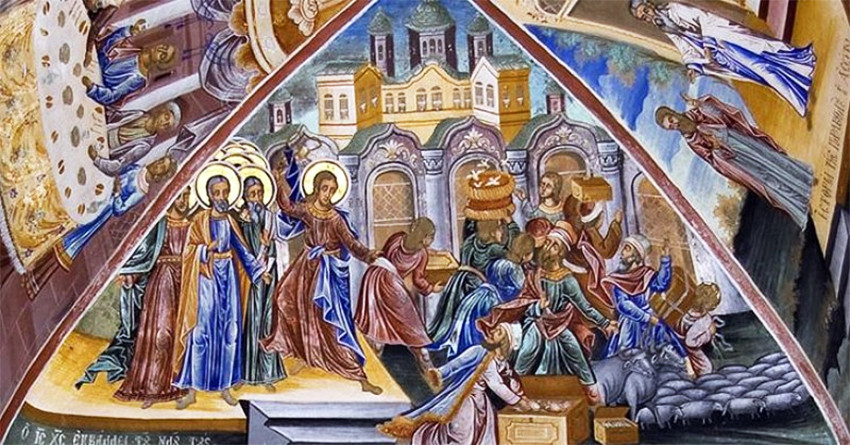Passion Week is the last week before Easter. It is also the most austere week of fasting at the end of the long Great Lent, which prepares the faithful for Christ's Resurrection. It begins after the Sunday on which Christians celebrate the Lord's entry into Jerusalem, also known as Palm Sunday or Vrabnitsa (Willow Sunday) in Bulgaria, and ends on the day of the Resurrection of Christ - Easter.
Each day of Passion Week is called "Great" - Great Monday, Great Tuesday, and so on. Each day commemorates an important event - something that Jesus Christ did for humanity, or his teachings. In this way, Christians gradually prepare to meet and experience the holiest of Christian holidays - the Resurrection of Christ.
On Great Monday, the Evangelists tell us how the Son of God entered the Temple in Jerusalem and found it full of merchants. Filled with anger, Jesus overturned their tables and drove them out, because the Temple is a house of prayer, not a marketplace.

On this day the Church honours the Righteous Joseph the Fair, of whom the Bible tells us that he was one of the 12 sons and the favourite child of the Old Testament Patriarch Jacob, who lived around the 18th century BC. In ancient Judea, patriarchs were the leaders of the Sanhedrin - the "supreme Jewish court".
Joseph was sold by his envious brothers to traders who travelled to Egypt. There, in a foreign land, he suffered many hardships, but Pharaoh made him second in power and status in the entire kingdom.
Like the righteous Joseph, Jesus Christ was betrayed by His fellow Jews to the Roman oppressors, was tortured, and suffered for the sins of humanity.
On this day, the Church also recalls the symbolism of the barren fig tree that withered after being cursed by the Lord. "Every tree that bringeth not forth good fruit is hewn down, and cast into the fire," he said.
In the same way, Christians are called to bear spiritual fruit by striving to be good, avoiding evil, filling themselves with virtue and growing in faith.
There is a map which helped usher in the birth of modern Bulgaria during the Russo-Turkish War of 1877-1878. The Austro-Hungarian researcher Felix Kanitz (1829 – 1904) was the first West European to have travelled to more than 3,200 towns and villages..
On 3 March, Bulgaria celebrates the 147th anniversary of its liberation f rom five centuries of Ottoman rule. The day was declared a national holiday in 1990 by a decision of the National Assembly. The Treaty of San Stefano, signed on 19 February..
Today is Cheesefare Sunday. According to Orthodox tradition, this day is observed on the eve of Great Lent, when Christians seek and give forgiveness to each other . It is also known as Sirni Zagovezni because it marks the last day before Lent, when..
The attack in the "St. Nedelya" cathedral on April 16, 1925 is the deadliest terrorist act in the history of Bulgaria. It took place on..
On the day of Holy Wednesday, one of the last events before the saving sufferings for humanity of the Son of God is remembered. In her sincere..
On that day the Saviour hosted the traditional Passover meal for the Jewish people at the home of a Jerusalemite. Before the meal, as a sign of respect, He..

+359 2 9336 661
